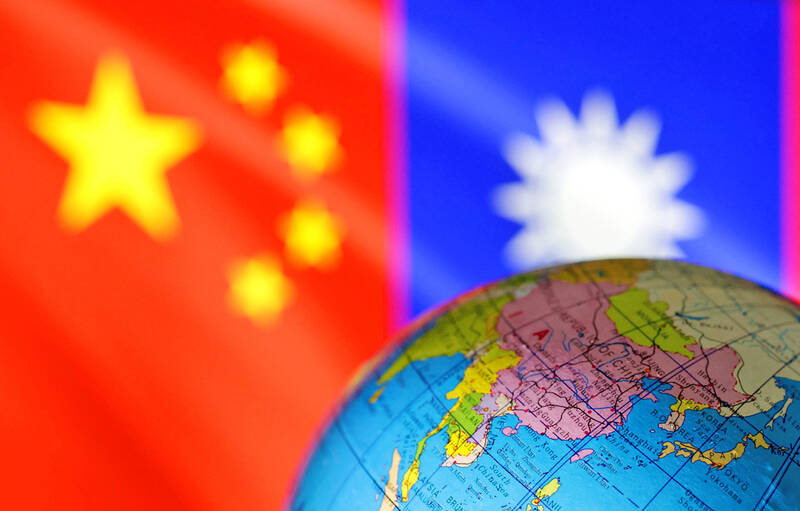The majority of Chinese consider US-China disputes, global pandemic and “international military intervention in Taiwan” the top threats facing China, a poll conducted by a Beijing-based think tank published on Wednesday last week showed.
The poll from the Tsinghua University Center for International Security and Strategy, which was discussed in a report by Hong Kong’s South China Morning Post on Sunday, surveyed Chinese on what issues they felt most threatened China’s security.
The poll found that 74.1 percent of respondents believe there is a “high” or “relatively high” security risk to China due to US-China disputes.

Photo: REUTERS
The risk of a global pandemic and international military intervention in a conflict over Taiwan were the second-highest concerns cited by respondents, tying at 72.4 percent each in the poll.
The news report said that the US was the country most able to affect China’s security, and that most Chinese had a more favorable attitude toward Russia than toward the US.
In order, the countries that respondents felt have the greatest effect on China’s security were the US at 52.7 percent, Russia at 17.7 percent and Japan at 17.1 percent.
In terms of their opinion about other countries, 59.1 percent said they had a “very negative” or “relatively negative” opinion of the US, while 57.5 percent answered similarly about Japan. Asked about Russia, 7.8 percent expressed a negative opinion.
“What deserves our attention is that the people of China and the United States have negative perceptions of each other’s countries,” center director Da Wei (達巍) said, adding that perceptions have gradually deteriorated as the relationship between the two countries worsened.
Da was likely referring to the most recent annual survey by the Pew Research Center in Washington, which showed that a record 83 percent of US respondents held a negative view of China.
The poll also asked respondents about their opinion on the Russia-Ukraine war, to which 80.1 percent said they believed that “the US and other Western countries” were responsible for the war, while 11.7 percent said that Ukraine was responsible and 8.2 percent said that Russia was responsible.
The poll, which surveyed 2,661 people, was conducted in November last year.
At the time of the poll, restrictions imposed due to the COVID-19 pandemic had not yet been lifted in China, and Chinese President Xi Jinping (習近平) was preparing to meet with US President Joe Biden for the first time since Biden took office.

An essay competition jointly organized by a local writing society and a publisher affiliated with the Chinese Communist Party (CCP) might have contravened the Act Governing Relations Between the People of the Taiwan Area and the Mainland Area (臺灣地區與大陸地區人民關係條例), the Mainland Affairs Council (MAC) said on Thursday. “In this case, the partner organization is clearly an agency under the CCP’s Fujian Provincial Committee,” MAC Deputy Minister and spokesperson Liang Wen-chieh (梁文傑) said at a news briefing in Taipei. “It also involves bringing Taiwanese students to China with all-expenses-paid arrangements to attend award ceremonies and camps,” Liang said. Those two “characteristics” are typically sufficient

A magnitude 5.9 earthquake that struck about 33km off the coast of Hualien City was the "main shock" in a series of quakes in the area, with aftershocks expected over the next three days, the Central Weather Administration (CWA) said yesterday. Prior to the magnitude 5.9 quake shaking most of Taiwan at 6:53pm yesterday, six other earthquakes stronger than a magnitude of 4, starting with a magnitude 5.5 quake at 6:09pm, occurred in the area. CWA Seismological Center Director Wu Chien-fu (吳健富) confirmed that the quakes were all part of the same series and that the magnitude 5.5 temblor was

The brilliant blue waters, thick foliage and bucolic atmosphere on this seemingly idyllic archipelago deep in the Pacific Ocean belie the key role it now plays in a titanic geopolitical struggle. Palau is again on the front line as China, and the US and its allies prepare their forces in an intensifying contest for control over the Asia-Pacific region. The democratic nation of just 17,000 people hosts US-controlled airstrips and soon-to-be-completed radar installations that the US military describes as “critical” to monitoring vast swathes of water and airspace. It is also a key piece of the second island chain, a string of

The Central Weather Administration has issued a heat alert for southeastern Taiwan, warning of temperatures as high as 36°C today, while alerting some coastal areas of strong winds later in the day. Kaohsiung’s Neimen District (內門) and Pingtung County’s Neipu Township (內埔) are under an orange heat alert, which warns of temperatures as high as 36°C for three consecutive days, the CWA said, citing southwest winds. The heat would also extend to Tainan’s Nansi (楠西) and Yujing (玉井) districts, as well as Pingtung’s Gaoshu (高樹), Yanpu (鹽埔) and Majia (瑪家) townships, it said, forecasting highs of up to 36°C in those areas